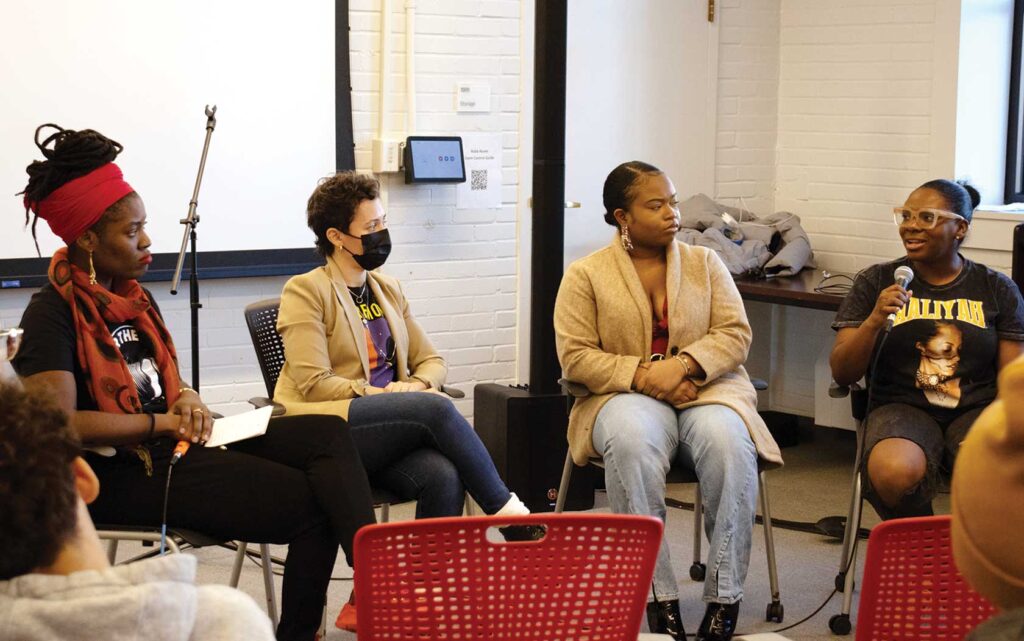Elevating the voices of the disappeared
Mics for the Missing holds second annual event at Tufts

Mics for the Missing, a local group formed to give voice to young missing people of color, held an emotional gathering last week to draw attention to the lives of those who have disappeared but are not forgotten.
During the organization’s second annual meeting on the Tufts University campus, attendees walked into the Rabb Room with photos and fliers of the missing displayed on every wall.
“We want you all to see these faces and feel it,” said Mics for the Missing co-founder Mayowa Osinubi.
Osinubi, who studied diversity, equity and leadership at Tufts, launched the group with fellow student Mary-Alexandra Molina in December 2022 after producing a final project on the issue. Both felt shocked at the lack of awareness and action to address the size and scope of the problem.
According to the Black & Missing Foundation, as of 2023, people of color made up about 40% of missing persons cases, though African Americans make up about 13% of the U.S. population. About 34% of missing youth are Black.
Yet that disproportionate representation remains little known.
Mics for the Missing aims to raise awareness and elevate the voices of missing Black, Indigenous, and people of color largely forgotten or overlooked by the media and law enforcement.
During the Tufts meeting, Osinubi encouraged people to study and absorb the faces around them in hopes they might help trigger recognition at some point and ultimately aid in the safe return home of missing youth of color.
Adding to the event’s drama were spoken-word and vocal performances by students about their own lives and those of people like them.
Speakers during a panel discussion pointed out that in many instances, missing person cases involving young people of color are pigeon-holed as runaways, thus giving them less priority. The “adultification” of Black youth, another recurring trend, especially for missing females, allows authorities to downplay dangers under the false projected belief that Black youth in their late teens are equipped to cope with exploitation.
Daphne Walker, Founder and Creative Director of Canvas Studio Boston, pointed out that young Black people are often more vulnerable because of a lack of resources, a lack of safe spaces or a lack of respect for who they are.
Youth facing such dilemmas, she said, “have to convince everyone else in the room that there is space for me and that there is value in my voice.” Compounding the challenge is an issue captured in the phrase “Missing White Woman Syndrome,” coined by the late journalist Gwen Ifill. It describes obsessive media interest in cases of missing white women versus similar disappearances of people of color.
The Columbia Journalism Review put together a tool to illustrate this effect. Viewable at areyoupressworthy.com, the tool prompts for answers to a series of basic questions to determine the amount of press you are worth if you go missing.
The event highlighted policy and statistical issues around the missing, and also included safety tips to help the general public recognize young people about to bolt, living inappropriately on their own, or under the sway of adult exploiters or kidnappers. Modeling what consent looks like for a child is an essential part of that recognition.
For those interested in more information, organizers of the event recommended The National Center for Missing and Exploited Children.
Checking such resources and being more aware of the problem could help lead to the recovery of missing teens from Massachusetts, like 17-year-old Demarkus Atkins, who went missing on Oct. 30, 2023, around Lawrence, or 14-year-old Jayleen A. Miranda-Lopez, who was last seen on Jan. 27, 2024, around Framingham.








